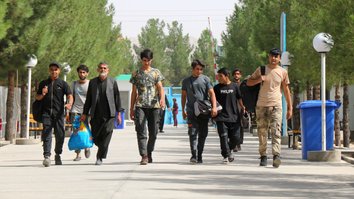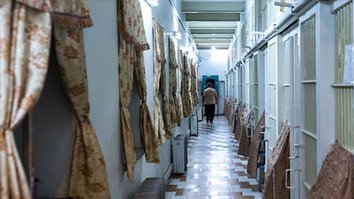HERAT -- Afghan prisoners who recently returned from Iran under a prisoner exchange agreement between Kabul and Tehran say they faced systematic abuse and torture while detained in Iranian prisons.
More than 600 Afghan prisoners, including 16 women, have been transferred back to Herat province from Iran so far this month, where they are expected to face retrial under Afghan law.
The prisoners returned to Afghanistan in two batches, with one group arriving on March 15 and another arriving March 10.
Some Afghans who returned from Iran with the first group of prisoners, on March 10, told Salaam Times they had suffered mistreatment and torture in Iranian prisons.
![Afghans formerly imprisoned in Iran arrive at Herat Central Prison on March 10. [Omar/Salaam Times]](/cnmi_st/images/2021/03/18/28951-Afghan-prisoners-arrive-585_329.jpg)
Afghans formerly imprisoned in Iran arrive at Herat Central Prison on March 10. [Omar/Salaam Times]
Esmatullah of Herat city said he had spent four years in an Iranian prison.
He said Iranian soldiers ripped off his fingernails to force him into confessing to drug trafficking. He was sentenced to 29 years in prison and fined 1.9 billion IRR ($45,000) by an Iranian court for smuggling 1kg of opium.
"Iranian guards threatened to pull off our nails and [pull out our] hair with pliers if we did not confess," he said, and would "punch and kick prisoners".
"Soldiers cursed and misbehaved, and when we would respond, they would come in a team of five or six and beat us," Esmatullah said.
"Iranian soldiers psychologically tortured Afghan prisoners," said Abdul Qader Noorzai, an Afghan who received a 24-year sentence in Iran. He served four years.
Iranian authorities forced the inmates to do construction work and other labour, he said, adding that if they refused, the authorities placed them in solitary confinement or threatened to transfer them to another prison.
"I was innocent, and I could prove it," Noorzai said. "But Iranian soldiers tortured me and made me give a false confession under torture."
'Crimes against humanity'
The Afghanistan Independent Human Rights Commission office in Herat is among the agencies that describe the torture of Afghan prisoners and their forced labour in Iranian prisons as human rights violations and crimes against humanity.
"No one has the right to torture suspects to obtain confession or information," said Mirwais Amini, interim director of the commission's Herat regional office.
"Torturing suspects in prison is strictly banned," he said. "Any government that tortures prisoners commits crimes against humanity."
Torturing suspects to extract confessions results in the unjust incarceration of many innocents, said Amini.
Similarly, he said, forcing prisoners to work is never allowed.
The Iranian government always has treated Afghan refugees inhumanely, according to Abdul Qader Kamel, a political analyst in Herat city.
Kamel urged the Afghan government to lodge a complaint with the International Court of Justice in The Hague in order to seek an end to the torture.
Iran might try to use these prisoners as cannon fodder in Islamic Revolutionary Guard Corps (IRGC)-aligned militias fighting in Syria, he said, referring to forces like the Fatemiyoun Division.
"If Afghans in Iranian prisons respond positively to the demands of the Iranian government, they will be sent to fight Iran's proxy wars in Syria, but if they respond negatively, they will be tortured," he said.
Reassessment under Afghan law
Returning prisoners who received lengthy prison sentences from the Iranian judiciary will be tried anew under Afghan law, said Herat provincial officials.
A special tribunal will begin functioning soon in Herat to reassess Iranian court rulings, said Abdul Haq Ahmadi, director of the Herat Attorney General's Office.
His office is reviewing these cases on an expedited basis, he said, and will hand them over to the court in a few days.
During the past four years, more than 1,000 Afghan prisoners have been transferred from Iranian prisons to Afghanistan, Ahmadi said.
Afghanistan released the majority of them, since they had committed minor crimes, he said, adding Iranian rulings on these cases are no longer valid.
Based on the relevant memorandum of understanding between Iran and Afghanistan, a large number of Afghan citizens imprisoned in Iranian prisons will be repatriated, said Jilani Farhad, a spokesman for the Herat governor.
Afghanistan will enforce Afghan law in their cases, he said.
"The government of Afghanistan is committed to paying serious attention to Afghan citizens imprisoned in other countries, especially neighbouring countries," he said.
"We will not allow Afghans to spend years in foreign prisons for very minor crimes," Farhad said.








I think it is good in Afghanistan.
Reply3 Comment
All of them are lying, because they want the Afghan government to exempt them from their imprisonment and release them. The crimes that these Afghans have committed against the Iranian people in Iran are unforgivable. They raped the wives of the Iranian people and killed their daughters and sons. They committed hundreds of heinous crimes in Iran.
Reply3 Comment
Iran is a big enemy of Afghans and Afghanistan. On one side, they send Afghans to Syria and Iraq to fight there and on the other side they send them to Afghanistan to destroy water and electricity dams, and those who want to do labor works in Iran, they put them in jails on one name or other. Pakistan treats Afghans similarly. Either they encourage them to fight in the ranks of Taliban in Afghanistan or press them in one way or other. The Afghan government, with the help of the international community, should first and foremost repatriate Afghans from Iran and Pakistan to avoid cruelties against them.
Reply3 Comment